Federal Chancellor Scholz in the Ruhr region
Federal Chancellor Olaf Scholz visited the Ruhr region on Saturday. At a steel company in Mülheim, he talked to the workforce about the challenges facing the energy and raw materials sector as a result of the war in Ukraine. Scholz stressed that energy had to be both climate-friendly and affordable. In the afternoon, he visited Innovation City in Bottrop.

In Mülheim on Saturday, Federal Chancellor Olaf Scholz emphasised the importance of the steel industry for a successful energy turnaround in Germany.
Photo: Bundesregierung/Kaiser
The war of aggression against Ukraine is currently creating major challenges for companies. “We live in turbulent times,” said Federal Chancellor Scholz during his visit to FWH Stahlguss GmbH in Mülheim on Saturday. “We’re seeing very clearly now how high energy prices are posing an enormous challenge for companies and for the work being done at places like this,” said Scholz during the visit.
Steel will be needed in future, too
Steel is just one of the industries that has been severely impacted by the rise in energy prices. Other problems include restrictions in the supply chains and rapidly declining steel stocks due to the import ban on steel and iron products from Russia. “Steel of the very highest quality will continue to be required in the future. That’s why Germany has to maintain its capabilities to manufacture, process and produce steel – as we can see is happening right here,” said Scholz on Saturday. The Federal Government has set itself the aim of ensuring that Germany’s electricity and energy will not only be carbon-neutral and climate-friendly in the future but also affordable. “This is our overriding goal in terms of everything we’re planning for the future,” stressed the Federal Chancellor.
Concrete measures by the Federal Government
Scholz also explained what this support would look like in practice: the Federal Government is seeking to provide the industry with the necessary investment security based on predictable framework conditions, accelerated planning and award procedures, and CFDs (contracts for differences). The unbureaucratic provision of low-interest loans was already approved for this purpose as part of the package of measures decided on by the coalition committee on 23 March. Scholz emphasised that the steel industry “is a technology that will continue to be needed in future for many years to come.”
Energy plus
The second part of his trip took the Federal Chancellor to the city of Bottrop, where he was given insights into the “Innovation City Ruhr” project. This is concerned with developing innovative ideas and solutions to meet the challenges of climate and structural change in urban areas. One example is the so-called energy-plus houses, which the Federal Chancellor also visited. These are buildings that have a positive ecological balance. For Scholz, this is “a good sign and encouraging in terms of what we’ve set out to do to develop and modernise our country.”